Where to Sell a Meteorite: A Comprehensive Guide
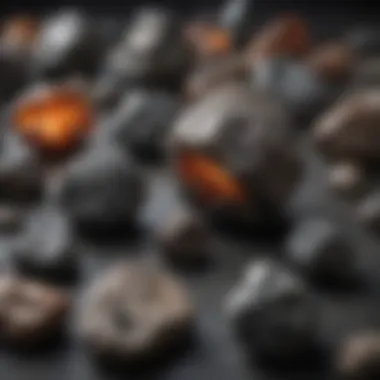
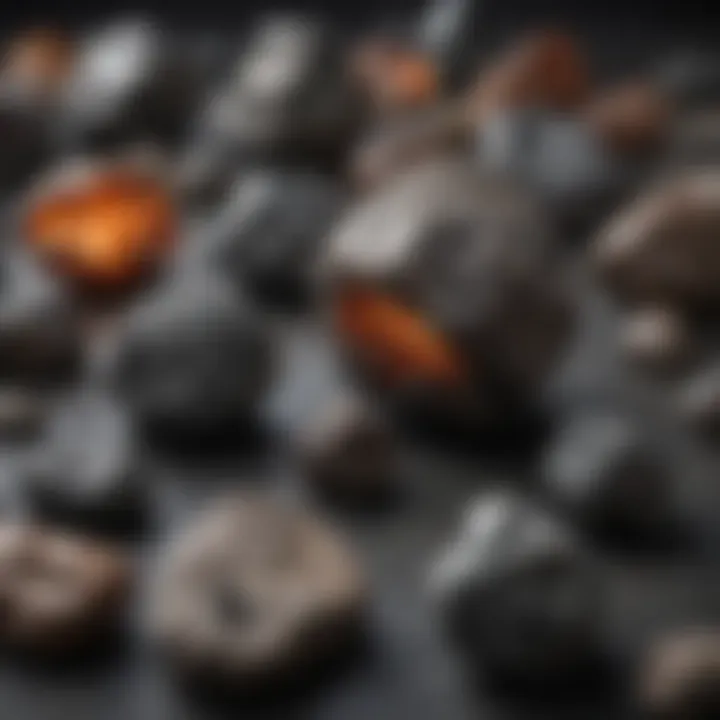
Intro
Selling a meteorite can be a complex story. The path from discovering a unique rock from space to finding the right buyer involves several steps. Understanding how to effectively sell meteorites requires knowledge about the market, proper valuation, and authentication processes. There are also particular challenges that sellers often face. This guide aims to help you navigate these aspects, and it addresses the essential points to consider during this journey.
History and Origins
Meteorites capture the imagination of many, but their historical and cultural significance goes beyond mere fascination. These objects from outer space have been part of human history for centuries. Many ancient civilizations attached spiritual and ceremonial importance to meteorites. They were not just seen as rocks; they were believed to carry messages from the gods or cosmic messages from the universe.
Overview of Collectibles, Rocks, and Fossils
Meteorites fit within a broader category of collectibles that includes rocks and fossils. Collectors often pursue rare or unique pieces, and meteorites can hold a particular allure due to their extraterrestrial origin. The community of rock and fossil collectors is diverse, encompassing those who seek beauty, rarity, and scientific value in their collections.
Historical Significance and Cultural Impact
The history of meteorite collection dates back to ancient times. Early peoples revered fallen meteorites and incorporated them into various aspects of life, including religious practices and art. As scientific understanding evolved, meteorites became crucial in developing theories about planetary science and the origins of life on Earth. The continuous interest in meteorites underscores their perennial significance in humankind’s quest for knowledge about the cosmos.
Identification and Classification
Before moving into the selling process, it is essential to be able to properly identify and classify a meteorite. Differentiating between meteorites and ordinary Earth rocks can be a challenging task, yet it is crucial for potential sellers.
Guide to Identifying Rocks and Fossils
Identifying a meteorite involves looking for unique characteristics such as:
- Fusion crust: This is a thin black or brown superficial layer that forms as a meteorite passes through the atmosphere.
- Metallic flakes: Many meteorites contain nickel-iron metal, which can often be seen when a specimen is cut or polished.
- Density: Meteorites are typically denser than ordinary rocks. This can be a simple test using a scale.
Common Types and Variations
Understanding the classifications of meteorites can significantly impact their value and desirability:
- Stony Meteorites: These are the most common type, made of silicate minerals.
- Iron Meteorites: Composed primarily of nickel-iron, these are often heavy and have a distinct metallic look.
- Stony-Iron Meteorites: A mixture of metal and silicate, these are rarer and often of high interest to collectors.
It is vital to categorize your meteorite correctly. Proper identification not only aids in valuation but also builds credibility in the selling process.
Understanding Meteorites
Selling a meteorite requires a solid understanding of what meteorites are. Many sellers may overlook this aspect, but knowledge about meteorites enhances credibility and can potentially impact sale price. Moreover, appropriately appreciating the features of meteorites aids buyers in making informed decisions. By grasping the foundational aspects of meteorites, sellers are better positioned in the marketplace.
Definition and Types of Meteorites
Meteorites are fragments of solid material that have traveled from outer space and landed on Earth. When a meteoroid survives its passage through the atmosphere and reaches the ground, it becomes a meteorite. They are classified into three main types:
- Stony Meteorites: These are the most common types, making up about 94% of all meteorite finds. They are composed mainly of silicate minerals and are further divided into chondrites and achondrites.
- Iron Meteorites: Composed mainly of iron and nickel, these meteorites account for about 5% of finds. They often exhibit a unique crystalline structure known as Widmanstätten pattern when cut and polished.
- Stony-Iron Meteorites: As the name suggests, these meteorites contain both silicate minerals and metals. They are relatively rare, making up about 1% of known meteorites.
Understanding these classifications helps potential sellers identify what they possess, which can be critical for valuation and selling. Knowing the characteristics of each type can enhance negotiations with potential buyers.
The Significance of Meteorites
Meteorites hold considerable scientific importance. They provide insights into the formation and evolution of our solar system. Each meteorite contains clues about the early processes that shaped planetary bodies.
In addition to their scientific value, meteorites have significant appeal as collectibles. Many enthusiasts seek rare or unique specimens, hoping to add them to their collections. The allure is not just academic; it is also aesthetic. Beautifully preserved meteorites can display intriguing patterns and coloring that captivate many collectors.
Furthermore, owning a meteorite can be a conversation starter. They evoke a sense of wonder and curiosity about the universe, space exploration, and the origins of Earth itself. For collectors and sellers alike, understanding both the scientific and cultural significance of meteorites adds depth to their appreciation of these celestial objects.
"Meteorites are windows to the universe, carrying stories from the cosmos that inspire reverence and curiosity."
The Meteorite Market Landscape
The meteorite market landscape is a complex and intriguing field that reflects not only the rarity of these cosmic artifacts but also the evolving interests of collectors and investors. Understanding this landscape is crucial for individuals looking to sell meteorites. It helps in identifying potential buyers and appropriate platforms that will yield the best return on investment.
Key elements include the current trends influencing demand, the historical context that has shaped the trading of meteorites, and the various channels through which meteorites can be sold. This knowledge is essential not just for maximizing sales but also for ensuring a connection with others who share similar interests in this niche hobby.
Current Trends and Demand
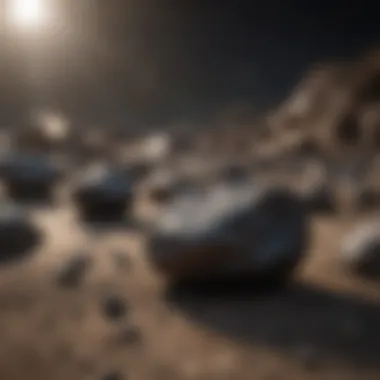
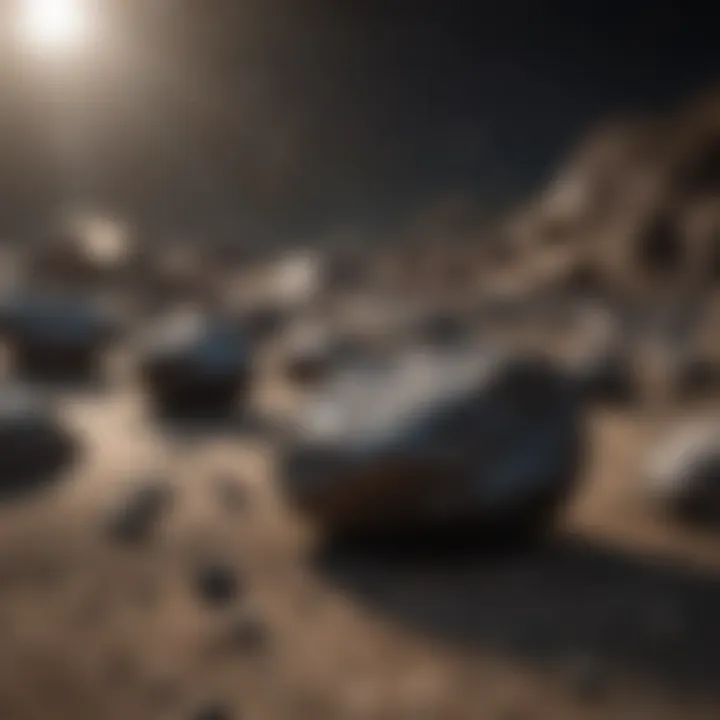
In recent years, the demand for meteorites has grown significantly. Collectors seek unique pieces for their collections, often looking for rare specimens that stand out in terms of composition and story. Factors such as provenance and scientific significance contribute heavily to desirability.
The rise of online marketplaces has transformed how collectors engage with one another. Social media and online forums have also played an important role in raising awareness and promoting discussions about meteorite appreciation.
Current trends show that the best-selling meteorites are often those that are part of notable falls or have scientific value, which can enhance their market price considerably.
Moreover, educational institutions and museums increasingly seek meteorites for their displays, further driving demand. This trend reflects an expanding public interest in space and planetary science, making meteorites even more valuable as tangible connections to the cosmos.
Historical Context of Meteorite Trading
The trading of meteorites has a rich history that dates back centuries. Initially, meteorites captured the attention of scientists and the curious alike, but they were also utilized as talismans or for their supposed mystical properties. As scientific understanding grew, so did the interest in their scientific and geological characteristics.
In the early 20th century, meteorite collecting began to emerge as a recognized hobby. Collectors often traveled to remote sites to discover and recover meteorites. Auctions and private sales became more common, establishing a more formalized market. Over time, institutions began to value meteorites, leading to their acquisition for scientific research.
The historical significance adds to the narrative of each meteorite's value, providing a deeper context for potential buyers. Understanding the history of a meteorite can greatly enhance its appeal in the market and provide a compelling sales pitch.
Valuation of Meteorites
Valuation is essential when selling meteorites. Understanding the worth of a meteorite ensures that sellers receive fair compensation that reflects its unique characteristics. The valuation process involves various factors that contribute to how much buyers are willing to pay. A well-informed seller can make better decisions regarding pricing and selling strategies. This section will outline key aspects of meteorite valuation and highlight significant factors that influence prices.
Factors Influencing Value
Rarity
Rarity plays a critical role in determining meteorite value. Unique specimens that are hard to find often attract higher prices. Collectors seek rare meteorites due to their exclusivity and potential investment value. Moreover, meteorites that originate from well-known celestial bodies, like Mars or the Moon, tend to be rarer than others. The unique feature of rarity not only adds to the meteorite’s desirability but also influences demand. However, the challenge with rare meteorites is that they may come with higher price tags, making it potentially less accessible for average collectors.
Type and Composition
The type and composition of a meteorite significantly affect its valuation. Different types include chondrites, achondrites, and iron meteorites. Each type has distinct characteristics and, thus, different appeal to collectors. For instance, chondrites are the most common and generally less expensive, while iron meteorites often garner higher prices due to their unique metallic properties. The unique feature here is that type and composition link to how well-documented the meteorite is. Well-analyzed specimens provide proof and add to their value, while uncertainties about a meteorite's type may raise concerns for potential buyers.
Condition and Size
Condition and size are essential considerations in meteorite valuation. A meteorite in excellent condition is more desirable than one that shows signs of damage or improper handling. Similarly, larger specimens often command higher values, but size must be matched with quality. The unique feature involved is that many buyers prefer a combination of both size and good condition; thus, having a well-preserved, sizable meteorite can increase the likelihood of a successful sale. However, larger meteorites may be harder to transport or store, which poses logistical challenges for sellers.
Comparative Valuation with Other Collectibles
When comparing meteorite valuation to other collectibles, several aspects stand out. Collectibles like stamps, coins, or vintage sports memorabilia are often evaluated based on historical significance and demand. Meteorites share this aspect, as their cosmic nature gives them a unique story and intrigue that other collectibles may lack.
Buyers in the meteorite market are often more niche than those for other collectibles. Nonetheless, both markets rely on similar valuation principles, like rarity and condition. The key takeaway here is that understanding the market dynamics of meteorites compared to other collectibles equips sellers with the knowledge needed to price their items more accurately. This considered approach can improve the selling strategy and potential profitability.
Authentication of Meteorites
Authentication of meteorites is crucial for both sellers and buyers in the meteorite market. It ensures that the items for sale are genuine and have not been misrepresented. In an industry where forgeries and misidentifications are unfortunately common, establishing credibility is vital. Buyers want certainty in their investments, while sellers seek to increase the value of their specimens through thorough authentication.
Importance of Provenance
Provenance refers to the history of ownership of a meteorite. Establishing provenance can significantly affect its value and desirability. When a seller can provide a clear origin story for the meteorite, buyers are more likely to feel confident in their purchase. Provenance can demonstrate the rarity of a specimen, its historical significance, or its scientific importance. If a meteorite comes from a notable fall or has been part of an important study, its value skyrockets. Thus, knowing and presenting the provenance can be a strong asset when aiming to sell a meteorite.
Methods of Authentication
Scientific Testing
Scientific testing plays a crucial role in verifying the authenticity of meteorites. This method often involves examining the mineral composition and isotopic ratios of a sample. The primary characteristic of scientific testing is its empirical nature; it relies on data gathered from controlled experiments instead of subjective assessments. This makes it a strongly preferred choice for many sellers aiming to certify their meteorites.
A unique feature of scientific testing is its ability to pinpoint the meteorite's classification, such as whether it is a chondrite or an achondrite, or if it has particular elemental signatures. The advantages of this method are clear: it establishes a solid scientific foundation for authenticity. However, it can also be costly and time-consuming, which may deter some sellers from pursuing this option.
Expert Consultation
Expert consultation involves seeking the guidance of a professional meteorite expert or a reputable dealer in the field. This approach is beneficial because it combines years of experience with a trained eye for detail. Experts can often quickly identify genuine meteorites based on appearance, texture, and other visual cues. Such consultations are popular among sellers who may not have the means to conduct scientific tests.
The unique feature of expert consultation is the personal touch it entails. Buyers can gain valuable insight regarding the meteorite’s history, rarity, and market value. However, this method has its disadvantages as well; not all experts are equally knowledgeable, and relying solely on verbal affirmation can sometimes lead to issues of trust. Therefore, it is wise to choose well-regarded experts, ideally those with a history of providing accurate identifications.
Always ensure that authentication methods employed offer verifiable evidence to support claims of authenticity.
Selling Platforms for Meteorites


Selling meteorites requires understanding the various platforms available to reach potential buyers. Each platform offers unique benefits and presents specific challenges. Knowing where to sell is crucial in maximizing the sale potential. This section delves into prominent selling platforms, helping collectors make informed decisions.
Online Marketplaces
Online marketplaces play a significant role in the meteorite selling landscape. These platforms allow sellers to reach a global audience instantly. Collectors can browse a wide array of meteorites from numerous sellers. The convenience of online transactions appeals to both buyers and sellers alike.
E-commerce Websites
E-commerce websites like eBay or Amazon provide a mainstream arena for selling meteorites. A key characteristic of these sites is the vast traffic they attract. Sellers benefit from an established customer base, increasing their chances of a quick sale.
A unique feature of e-commerce websites is their user-friendly interface. Sellers can create listings easily and manage sales directly from their profiles. However, there are downsides. Fees associated with listings can eat into profits. More importantly, competition is fierce, making it harder to stand out.
Specialty Marketplaces
Specialty marketplaces focus explicitly on meteorites and related collectibles. Sites like Meteorite.com cater to niche audiences, making them ideal for serious collectors. These platforms provide targeted marketing and expertise in the field of meteorites.
A defining feature of specialty marketplaces is that they offer a community-centric environment. Buyers and sellers share a common interest, enhancing trust and authenticity in transactions. Yet, the user base might be smaller than that of broader e-commerce websites. This can limit exposure, necessitating well-crafted listings to attract attention.
Auction Houses
Auction houses can offer a different approach to selling meteorites. They provide a formal, organized method for buyers and sellers to transact. This setting is often suitable for rare or valuable meteorites, where high bids can drive up the final price.
One notable advantage of auction houses is the negotiation aspect. Sellers may achieve a much higher selling price than anticipated if demand is strong. However, auction fees can be substantial, and there is always uncertainty regarding the final sale price. Additionally, the time it takes to organize an auction can be lengthy, which may not suit all sellers.
Employing the right platform for selling meteorites depends largely on individual circumstances and goals. Each option presents different dynamics, which can significantly influence the overall success of the sale.
Collector Communities and Forums
Collector communities and forums play a critical role in the meteorite selling ecosystem. These spaces not only foster connections among enthusiasts and professionals, but they also offer valuable resources for those looking to buy or sell meteorites. By engaging with these communities, sellers can tap into a wealth of knowledge, support, and potential buyers.
Engaging with Communities
Participation in collector communities is essential for gaining insights and building relationships within the meteorite trading sphere. Various platforms, such as forums and social media groups, provide opportunities for discussions about recent finds, market trends, and authenticating specimens.
For example, the Meteorite List is a widely recognized forum where members share experiences and knowledge. Here, users can ask for advice on pricing their meteorites or seek information about potential buyers. By actively engaging in these discussions, sellers bolster their credibility within the community.
When joining these communities, it’s important to remember that each platform has its own culture and etiquette. Being respectful and contributing valuable insights will go a long way toward establishing trust. One can also benefit from interacting with those who have faced similar challenges or have successfully sold their meteorites.
Value of Networking
Networking in collector communities can yield significant benefits for meteorite sellers. Establishing connections with fellow collectors, dealers, and enthusiasts opens doors to exclusive selling opportunities. Often, individuals within these groups have access to collectors looking for rare specimens, providing an immediate channel for potential sales.
Furthermore, networking can enhance a seller's understanding of price trends and demand. Knowing who to contact for expert advice can help in valuing meteorites accurately. Additionally, creating relationships with buyers can lead to future sales, as satisfied customers often refer others.
Engaging with the community also allows sellers to stay informed about upcoming events like meteorite shows or trade meets. These events can serve as ideal environments for sellers to showcase their collection and meet potential buyers face-to-face.
Strategies for Selling Meteorites
Selling meteorites is more than just putting the rock up for sale. It requires a strategic approach to ensure a successful transaction. This involves identifying the correct market audience, understanding the type of meteorite being sold, and preparing adequately for buyer inquiries. Furthermore, a seller must be cognizant of current market trends to maximize potential earnings while minimizing the risk of fraud.
Preparation for Sale
Documentation
Documentation is critical when selling a meteorite. It establishes provenance and authenticity, which are essential for attracting serious buyers. The key characteristic of good documentation is its ability to provide indisputable evidence of ownership and the meteorite's origin. This could include scientific studies, certificates of authenticity, or prior sales records. Buyers often seek this information to verify claims made by the seller.
A unique feature of thorough documentation includes the ability to potentially increase the selling price of a meteorite by demonstrating its historical significance. However, not all documentation carries the same weight. Sellers need to ensure that the documentation is credible and comes from recognized sources in the community, as this directly impacts buyer trust.
Photographic Evidence
Photographic evidence is another vital aspect of preparing a meteorite for sale. A clear and detailed visual presentation can greatly influence a buyer's decision. The key characteristic of strong photographic evidence is that it showcases the meteorite's unique features, such as texture, color, and any distinct markings. This visual representation helps convey the quality of the specimen to potential buyers.
Moreover, the unique feature of high-resolution, well-lit images can emphasize the meteorite's physical attributes effectively. Good photographs can lead to higher engagement and interest in the meteorite. However, sellers must take care to avoid over-editing images, as this can misrepresent the actual condition of the meteorite, leading to disappointed buyers and potential disputes.
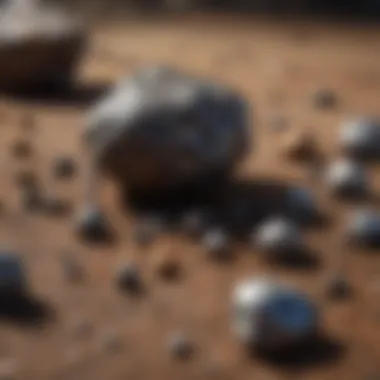
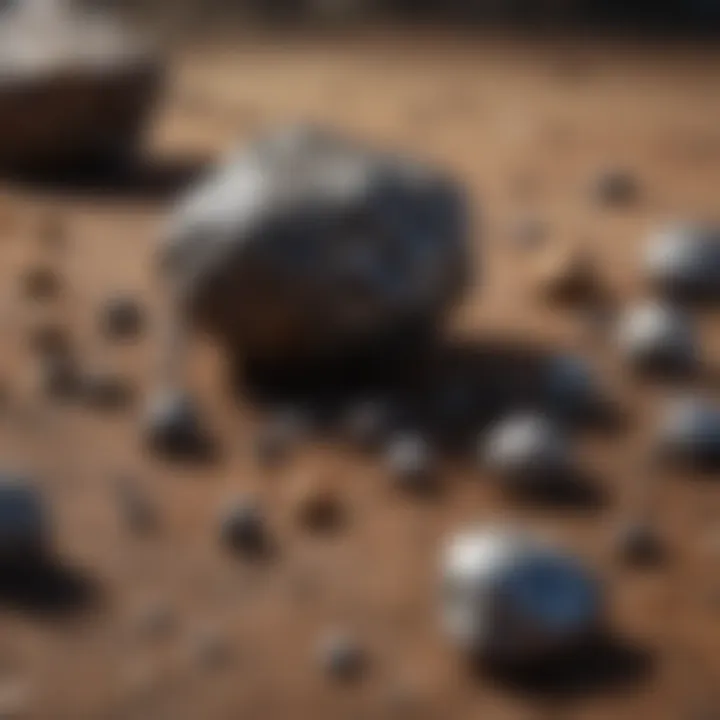
Crafting a Sales Pitch
Crafting a compelling sales pitch is essential in the selling process. A good pitch succinctly captures the essence of the meteorite, highlighting its unique qualities. This should include information on its composition, rarity, and provenance. Understanding the emotional appeal can also help, as collectors often buy not just for investment but for passion.
A well-structured pitch should address potential buyer concerns and questions. Including a personal story about how the meteorite was acquired or what makes it unique can create a connection with the buyer. Balancing technical information with engaging narrative can make the sale more compelling. This thoughtful approach to marketing can help differentiate the meteorite from others in the market, potentially leading to a successful transaction.
Legal Considerations in Meteorite Sales
Selling meteorites involves more than just finding a buyer and negotiating a price. Legal considerations play a crucial role in ensuring that transactions comply with local, national, and international laws. Understanding ownership rights and exportation laws can prevent legal disputes and enhance the seller’s credibility in this niche market.
Protecting oneself legally is beneficial for both the buyer and seller. Buyers prefer to engage with sellers who demonstrate awareness of legal frameworks. This awareness can lead to smoother transactions and higher likelihood of repeat business. Additionally, divulgence of legal knowledge can bolster one's reputation among collectors and enthusiasts.
Ownership and Rights
The concept of ownership over meteorites can be convoluted. Legally, anyone who legally finds a meteorite can claim ownership. However, this does not mean that ownership is absolute. There are certain considerations to keep in mind.
- Landowner Rights: If a meteorite is found on private property, the landowner typically retains rights to that meteorite. Sellers must establish clear ownership before attempting to sell.
- International Laws: Meteorites are often viewed differently in various countries. Some nations have stricter regulations. For example, in countries like Egypt or China, selling or removing meteorites from their territory can lead to severe penalties.
- Documentation: It is advisable to keep any documentation that proves ownership. Explicit records of where and how the meteorite was found can help avoid disputes.
Exportation Laws
When selling meteorites, exportation laws become a significant factor, especially if the transaction involves international buyers. Each nation has its own regulations regarding the export of meteorites. Sellers should pay careful attention to these laws to avoid unintended smuggling risks.
- Customs Regulations: Before exporting a meteorite, sellers must adhere to customs regulations. Certain countries may require permits that confirm the meteorite’s origin and legality.
- CITES Regulations: Depending on the type of meteorite, it may fall under international wildlife trade laws governed by the Convention on International Trade in Endangered Species (CITES). This is particularly relevant for meteorites that may contain rare minerals or organic materials.
- Consequences of Non-compliance: Failure to comply with export laws can result in confiscation of the meteorite. It can also lead to hefty fines or legal repercussions, undermining the seller's credibility.
Key Takeaway: Always verify legal requirements in the jurisdictions involved before attempting to sell a meteorite. This diligence not only protects you legally but also enhances your reputation in the community.
Understanding these legal aspects is fundamental for a successful transaction in meteorite sales. The foundation of informed decision-making begins with recognizing and respecting both ownership rights and exportation laws.
Potential Challenges in Selling Meteorites
Selling meteorites may seem straightforward, but it comes with its unique challenges. Understanding these challenges is essential for anyone looking to trade in this niche market. The potential issues can range from market dynamics to legal concerns. Each factor can significantly impact the selling process, pricing, and the overall experience of the seller.
Market Saturation
Market saturation is a key challenge when selling meteorites. The landscape of meteorite trading is evolving, with increasing numbers of sellers entering the market. This growth can dilute the value of individual pieces, especially common types like stone meteorites. As collectors become more discerning, it may be difficult for sellers to break through the noise of abundant listings. Prices could drop due to supply outpacing demand. Sellers need to keep tabs on current trends to find niches or specific types of meteorites that are still in high demand.
The following strategies can help mitigate the effects of saturation:
- Identify Unique Pieces: Focusing on rare or unique meteorites can set a seller apart from the competition.
- Target Specific Collectors: Understanding the interests of specific collectors can help tailor sales approaches to meet their needs.
- Maintain Quality: Ensuring meteorites are in pristine condition can help justify higher prices even in a saturated market.
Dealing with Fraudulent Offers
Fraudulent offers are another significant concern in the meteorite selling space. Unscrupulous buyers can attempt to take advantage of sellers, often by offering significantly lower prices or pushing for unverified payments. This risk is high in online transactions where physical inspection is not possible. Sellers must be vigilant in assessing offers and verifying the credibility of potential buyers.
To protect against fraud, sellers can:
- Verify Buyer Profiles: Check buyer's history in online marketplaces or collector forums.
- Use Secure Payment Methods: Opt for well-known platforms that have fraud protection measures in place.
- Consult the Community: Engage with fellow collectors or communities for recommendations and advice on trustworthy buyers.
"Knowledge is power. Equip yourself with information to navigate the complexities of selling meteorites."
Ending
Understanding the landscape of meteorite sales is crucial for any collector or enthusiast looking to sell their prized specimens. This section emphasizes the myriad of factors that influence the outcomes of meteorite sales. Through a comprehensive guide, we have navigated the complexities of valuation, authentication, and the various platforms available for both casual and serious sellers.
Recognition of legal considerations, combined with awareness of potential challenges such as market saturation and fraudulent offers, assists sellers in making informed decisions. The thematic elements discussed throughout this article serve as pivotal touchpoints. Whether it's grasping the intrinsic value of a meteorite or understanding the nuances of collector communities, each aspect contributes to an effective selling strategy.
Familiarity with the marketplace and developing solid networks within the community enriches the selling experience. Thus, the importance of a well-rounded approach is not to be underestimated.
Recap of Key Points
- Market Dynamics: Familiarize yourself with current trends and demands in the meteorite market.
- Valuation Criteria: Understand factors influencing the market value, including rarity, type, and condition of meteorites.
- Authentication Necessity: Authenticate your meteorite to enhance buyer trust and ensure legality in the sale.
- Selling Platforms: Explore various platforms, from online marketplaces to auction houses, that suit your selling needs.
- Networking: Engage with collector communities to broaden your reach and potential buyer base.
- Legal Awareness: Stay informed about ownership rights and exportation laws relevant to meteorite sales.
Future of Meteorite Sales
As interest in extraterrestrial materials grows, the future of meteorite sales appears promising yet challenging. With advances in technology, online platforms are likely to evolve, providing streamlined processes for buyers and sellers. Furthermore, scientific advancements in authentication methods may simplify the validation process, thereby enhancing confidence in the market.
The demographic of potential collectors is also shifting, characterized by a younger audience increasingly interested in unconventional and unique collectibles. This demographic shift could lead to new selling strategies that heavily leverage social media platforms like Facebook and Reddit.
Additionally, the environmental considerations related to collection and sale of meteorites may shape regulatory changes, impacting how sales occur in the future. As the scientific community continues to uncover the mysteries of meteorites, the allure for collectors will likely also grow, driving demand upward.
In summary, adapting to the dynamic nature of the market, understanding buyer psychology, and embracing technological changes will be critical components for anyone looking to sell meteorites successfully.



